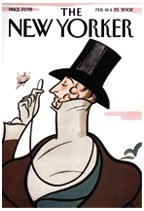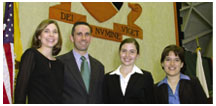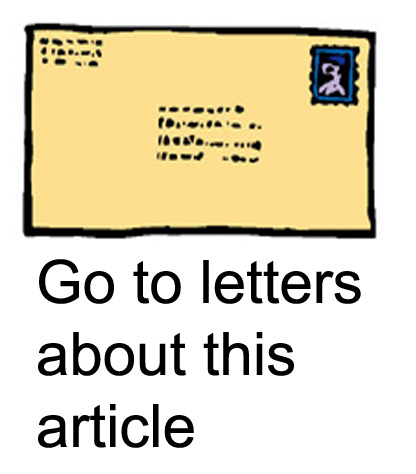March 27, 2002: Notebook
Honoring
alumni and students
Hundreds return to campus for lectures, awards, and events
Man
about New York
David Remnick ’81 talks with PAW about the editing life

The sunny climes of Hialeah, Florida, are not your typical academic research subjects. But sociology professor Patricia Fernandez-Kelly is so taken with the sociological richness of its predominantly Cuban exile population that she hopes to “place Hialeah on the academic map.”
The author of numerous books on international economic development, gender, and the labor force, she also coproduced the award-winning documentary The Global Assembly Line, which focused on the lives of the working class in the “free-trade zones” of developing countries and North America.
Born in Mexico City, Fernandez-Kelly received her Ph.D. from Rutgers University in 1981 and says most of her scholarly work has gone into examining the Cuban-American working class in Hialeah and South Florida. The lecture she gave on Alumni Day was entitled “Hialeah Dreams: The Remaking of the Cuban-American Working Class in South Florida.” She describes the city as “a place where different groups have left their imprint while trying to create a sample of what life should be like.”
Her work also covers the history of the city, which was envisioned as a playground for the rich until Cuban exiles fleeing Fidel Castro’s revolution in 1959 turned it into a working-class community.
Several other waves of Cuban exiles, including the Freedom Flights (1965—1973),
the Mariel boatlift in 1980, and the “balseros,” or boat people,
of the late 1990s eventually created in Hialeah the most economically
successful immigrant enclave in U.S. history. Hialeah is the only U.S.
industrial city that continues to grow, Fernandez-Kelly says. ![]()
By A.D.

Honoring
alumni and students
Hundreds return to campus for lectures, awards, and events
It would have taken a great artist to create a better setting for Alumni Day 2002.
The sun began warming the nearly leafless Princeton campus early on a radiant Saturday, February 23, and never wavered as more than 1,300 alumni, relatives, and friends spread out across Old Nassau to learn from, honor, and remember fellow members of the Princeton community.
As they moved to and from tours, workshops, and lectures held in the same buildings they had roamed during their college and graduate school days, many alumni showed off their old stomping grounds to their children and bumped into old friends or classmates along the way.
“We see you more here than in Darien [Connecticut],” said one couple to another as they passed each other behind Whig and Clio Halls.
And as the suggested age range (five to 95) for the performances of Robert N. Sandberg ’70’s play Sara Crewe, at Firestone Library, implied, it was a day once again designed for the “young and the young at heart,” said Margaret Miller ’80, director of the Alumni Council.
Along with the lectures from illustrious alumni and professors, the day’s events also included “Gargoyles, Gates, and Great Halls,” an Orange Key tour geared to middle school–aged children, and a seminar on the college admission process for high school students.
“I think it’s great that alumni come back for Alumni Day. It’s an affirmation of how much they love Princeton and how much they love hearing from the Princeton faculty and one another,” said Miller.
The world was a very different place when the first Alumni Day opened the campus up to alumni in 1915 as World War I raged in Europe. At that time, all of the Princeton graduates who returned could fit on the steps of Nassau Hall, said Alumni Association President Diane deCordova ’83, who moderated this year’s awards ceremony.
But 87 graduation classes later, another war and its effects were still on the minds and in the hearts of many.
Several lectures dealt with the war in Afghanistan, the Middle East, and the attacks on the U.S. on September 11, including a well-attended seminar entitled “Talking With Children in a Post-September 11 World.” The panelists included renowned pediatrician T. Berry Brazelton, Jr. ’40; Frederick H. Borsch ’57, retired bishop for the Episcopal Diocese of Los Angeles, university trustee, and Princeton parent; and Marsha Levy-Warren ’73, a psychiatrist and Princeton parent.
Two of the more popular lectures featured David J. Remnick ’81, editor of The New Yorker and this year’s winner of the Woodrow Wilson Award, and George B. Rathmann *51, one of the pioneers in the biotechnology industry and the 2002 James Madison Medal winner.
Rathmann, who has played a role in developing some of biotechnology’s most successful companies, including Amgen, painted an optimistic picture for his industry in his lecture, “Biotechnology: State of the Industry, 2002.” He also showed a softer side, getting choked up when discussing a woman who had benefited from one of the drugs Amgen developed. “Her daughter told us, ‘I got my mother back,’ ” said Rathmann, holding back tears.
At the awards luncheon and ceremony in Jadwin Gym, which had been turned into a banquet hall encircled with class banners, President Tilghman took the stage to a warm ovation from the crowd, and with evident pride and pleasure introduced the student award winners. The Porter Ogden Jacobus Fellowship was given to graduate students Howard Keeley and Melissa Miller, while the M. Taylor Pyne Honor Prize went to engineering student Abbie Liel ’02 and mathematics major Lillian Pierce ’02.
Robert Rawson, Jr. ’66, chair of the Board of Trustees and himself a 1966 Pyne Prize–winner, introduced the alumni award winners, who were visibly humbled by their honors. After being introduced, an emotional Rathmann accepted the Madison Medal, which has been given to such luminaries as writer Thornton Wilder *26, former NATO commander Andrew Goodpaster *50, and physicist Lyman Spitzer, Jr. *38. “You look at the people who have won this before and you don’t think you belong,” Rathmann said.
Remnick, a Pulitzer Prize–winning author, opened his acceptance speech by focusing on the student award winners. He said he had two thoughts as he listened to the inventory of the students’ many scholarly achievements. “First, I have no idea how I got into Princeton, and second, I feel lowly and pathetic,” he said, to big laughs.
President Tilghman returned to the podium to thank the large gathering of alumni for their efforts in their communities, their work on the Alumni Schools Committee, and their generous donations of time and money to their alma mater.
“It makes the difference between Princeton being good and Princeton being the best,” said Tilghman, who acknowledged that she was neither the person – nor the image – that many of the alumni expected to follow former president Harold Shapiro into Nassau Hall. But she added that she has been welcomed with “a generosity of spirit.”
“You’ve opened your homes to me. You’ve opened your hearts to me, and it’s made such a difference in my first eight months as president,” she said.
After lunch, alumni, friends, and family walked to the newly renovated
University Chapel for the annual Service of Remembrance, which honors
those Princetonians and university staff members who died the previous
year. ![]()
By A.D.

The Woodrow Wilson Award, bestowed on an alumnus who exemplifies “Princeton in the nation’s service,” was given to David J. Remnick ’81, editor of The New Yorker.
The Madison Medal, given to a distinguished alumnus from the Graduate School, was conferred on George B. Rathmann *51, an innovator in the biotechnology field.
The Moses Taylor Pyne Prize, the university’s highest general award for undergraduates, went to Abbie Liel ’02, a Marshall scholar, and Lillian Pierce ’02, a Rhodes scholar.
The Class of 1926 Trophy went to the Class of 1976, which set a 25th-reunion Annual Giving record of $5,447,376.
The Porter Ogden Jacobus Fellowship went to Howard J. Keeley and Melissa B. Miller for highest scholarly excellence in the Graduate School.
The S. Barksdale Penick, Jr. ’25 Award, given to outstanding Alumni Schools Committees, went to the Princeton Association of Virginia and the Princeton Club of Hong Kong.
The Alumni Council Award for Community Service went to the Princeton Club of Washington.
The Harold H. Helm ’20 award, a prize that recognizes exemplary and sustained service to Annual Giving, was awarded to Kristen W. Ames ’96 of Durham, North Carolina.
The Jerry Horton Award, presented to an outstanding regional Annual
Giving committee, was given to the regional committee of Eastern Fairfield
County, Connecticut, chaired by Charles Fredericks, Jr. ’47.
![]()

Jane Chapman Martin ’89, who has edited PAW since February 2000, announced that she will step down after the publication of the July 2002 issue because of family concerns. Martin and her husband, James K. Martin ’89, have two young children.
The position will be formally advertised in the April 10 issue. Applicants
may see the complete job description at http://jobs.princeton.edu/openjobs/.
![]()

 Man
about New York
Man
about New York
David Remnick ’81 talks
with PAW about the editing life
Is the air different at The New Yorker than in other places?
The New Yorker’s place in the history of American fiction, humor, art, and recording are pretty secure, but the worst thing an editor of The New Yorker could do is treat the magazine like a museum, or a museum piece. It’s a living, evolving thing. When The New Yorker began, there was no serious fiction and the reporting was brief and slight and mostly built around wit. The things that we think of as the modern New Yorker, which include serious criticism, fiction of real depth and moment, pieces that are about war as well as the lighter side of life — those evolved with time. Some people think that changes only happened at The New Yorker in 1992: Tina Brown came and there were photographs. That’s an utterly sentimental and inaccurate sense of the magazine. The magazine of 1925 is different than that of 1930. The magazine of 1960 is quite different than the magazine of 1970. A lot of those changes reflected the world around us.
Like the changes at Princeton?
I know The New Yorker better than I know Princeton. When you go to a university it sort of freezes in your mind because you’ll never have an attachment to it as intense as when you were there.
How would a young writer break into The New Yorker?
It’s always a matter of great pride when a magazine plays a great role in discovering somebody, like we did with John Cheever in the ’30s or countless others, I’m proud to say. That process is a very important part of what we do and our effort. But the odds are the odds, and we publish one short story a week, and it’s a crowded field.
How do you feel about getting the Woodrow Wilson Award?
I’m very honored. On the other hand, I feel like I’ve slipped one past somebody. I know that Eric Lander ’78 got this award a couple of years ago. He is a few years older than I am, and he was on the Prince when I was there. Even then he was a preposterously enormous genius. He is right now at the center of mapping the genome, and my job is to pick animal cartoons on Thursday afternoons and figure out if this talking-dog cartoon is funnier than this talking-alligator cartoon. So it’s lovely, but yet again I feel like I’ve slipped a fast one.
Have you felt that way about your journalism career before?
I feel that in that part of my life I’ve been very lucky. And my luck started at Princeton with getting into John McPhee ’53’s course. That changed my life because I took lots of literature courses at Princeton and it helped me to read more sensitively and deeply. I was lucky to have teachers like Robert Hollander ’55 and Suzanne Nash. I learned Russian badly, but that was only my fault. I was probably the worst Russian student they ever had. It’s been a very strange road. But it was never Princeton’s fault when I screwed up, and it was always to Princeton’s credit when something went right. I also credit the Press Club. I didn’t come to Princeton on a complete scholarship but I did need to make extra money to get by, and instead of waiting on tables at Commons I got into the Press Club. I learned a lot.
Are you doing any writing now?
I had a piece in the magazine about a month ago. But there’s only
so many hours in the day. I have three children and recently moved. I’m
a fairly quick writer, but you can’t just say, “Here’s
two hours and I’ll get two hours of writing done.” You need
eight hours in order to get two hours of writing done. You need to screw
around, you need to stare at the screen, you need to walk to the refrigerator.
That kind of time is not always available, and it would be a real disservice
to my colleagues and to the magazine if I were to give just my left hand
or just my right hand. It needs all my appendages, however stubby they
may be.![]()
By Maria LoBiondo
Maria LoBiondo is a frequent contributor to PAW.
For the full Remnick interview go to PAWPLUS at www.princeton.edu/paw/plus.

In Brief
James A. Baker, III ’52, who has served as both U.S. secretary of state and secretary of the treasury, will be the keynote speaker at this year’s Class Day ceremony June 3. Baker was selected by leaders of the senior class from among numerous nominees suggested by classmates. The Class of 1952 is the grandfather class for the Class of 2002.
Meg Whitman ’77, president and chief executive officer of eBay,
Inc. and a Princeton trustee, will be the speaker at this year’s
Baccalaureate, the interfaith worship service that is one of Princeton’s
oldest traditions. “Members of the senior class suggested Meg Whitman
as a speaker several weeks before any announcement of the Whitman College
gift because of their own interest in eBay and e-commerce and because
the Class of 1977 has a special, supportive relationship with the Class
of 2002,” said Vice President and Secretary Thomas Wright ’62.
“We are very grateful that she has agreed to speak.”
![]()



